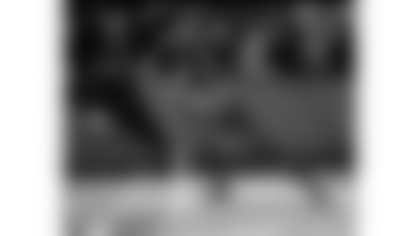BOURBONNAIS, Ill. – This offseason, the NFL rules committee held to the path they've been on for the past two decades.
Instant replay will expand. Dangerous plays will be limited.
Adrian Hill, a veteran referee, spoke with reporters at Bears training camp about the changes Monday afternoon.
The most noteworthy change will be the inclusion of pass interference penalties as a reviewable call. The move comes after a controversial missed call against Rams cornerback Nickell Roby-Coleman in the NFC Championship game.
"Like for many of the plays that are in replay now," said Hill, "there's been some incident that happened, and now that becomes a reviewable aspect the next year. I could cite 10 things that are reviewable now, and it's because of some play."
Clarifying the rulebook in response to playoff controversies has been a time-honored tradition in the NFL. Past examples include the understanding of the Tuck Rule in 2001 and the incomplete pass to Cowboys receiver Dez Bryant in 2015.
In some areas, the NFL's tinkering has paid off. According to Hill, this marks the first offseason since the Bryant call that the catch rule has not been altered. Hill notes that the definition of a catch was a non-issue last year, so any change would be unnecessary.
For pass interference, Hill doesn't believe the change will have any effect for the referees, as there was no change in the rulebook to the penalty itself. Hill welcomes the added scrutiny of the replay booth.
"For us," said Hill, "it doesn't affect how we call it. We're going to call it the same, but none of us want to be responsible for some type of error that could be corrected."
The review process will require the same clear and convincing evidence standard present in past years in regards to fumbles, catches and helmet-to-helmet contact.
"When we review a play," said Hill, "the assumption is going to be that the call on the field was correct. We have to have clear and obvious video evidence that an error was made. Now, we got an opportunity to correct those types of errors."
In the 20 years since the replay system was overhauled and made permanent, the scope of the review booth has only grown. However, its accuracy, in terms of reviewed plays resulting in an overturned call, has jumped over 15 percent since the 1999 season.
Now, the replay booth is just part of life for a referee.
"Replay has been around for long enough now where we've all essentially grown up with replay," said Hill, who started with the NFL in 2010. "It's a part of the game, and it's expanded each year."
The change is likely to be felt most by head coaches, who will now have more chances to affect the game with challenges.
"There's some difficult spots you can be in as a head coach," said coach Matt Nagy, "to where you have to choose early on in the game are you going to challenge that or not. And so we have some coaches on staff that know this is the rule inside out."
Added to the complexity will be the possibility that a no-call might go the other way. In a tangle of a defender and a receiver, either side could be assessed the penalty.
"For any of those," said Hill, "whether it's a coach challenge or booth review, once the door is open then we review all aspects."
While the addition of the pass interference review has been the most covered change in the rulebook, the enforcement of safety-based rules will likely be a major storyline this season.
The league has codified its rules on helmet-to-helmet contact from last season. The rule change sparked an increase in calls during the preseason before tailing off once the regular season began. According to Hill, the league has shown referees missed calls and increased enforcement is likely.
Similarly, the league has banned blindside blocks. Offensive players will no longer be allowed to deliver hits while running parallel or toward their own endline. Such blocks will only be permissible if the player does not initiate contact.
"You can screen the guy," said Hill. "You can put your hands out in front, but any of that kind of leading action is going to be a foul."







